Unit 1 Festivals and Celebrations Listening and Speaking 课件(共31张,内嵌音频) 2024-2025学年高一英语人教版(2019)必修3
文档属性
| 名称 | Unit 1 Festivals and Celebrations Listening and Speaking 课件(共31张,内嵌音频) 2024-2025学年高一英语人教版(2019)必修3 | 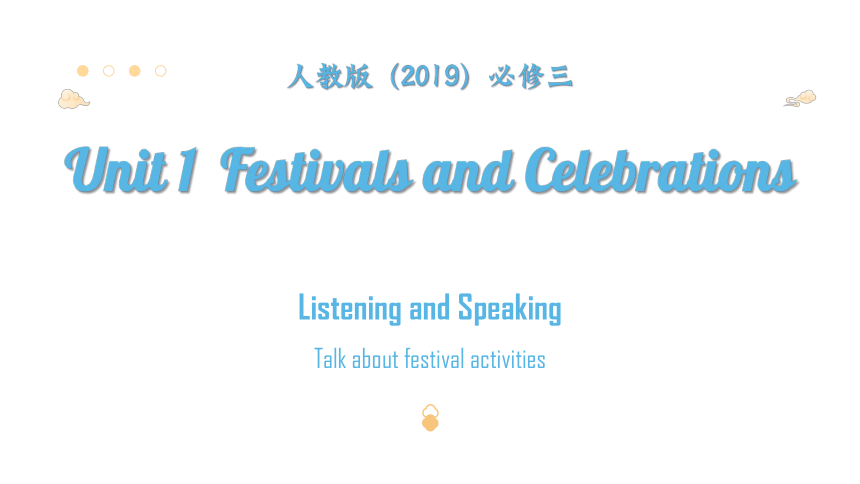 | |
| 格式 | pptx | ||
| 文件大小 | 57.3MB | ||
| 资源类型 | 教案 | ||
| 版本资源 | 人教版(2019) | ||
| 科目 | 英语 | ||
| 更新时间 | 2025-04-15 16:20:41 | ||
图片预览

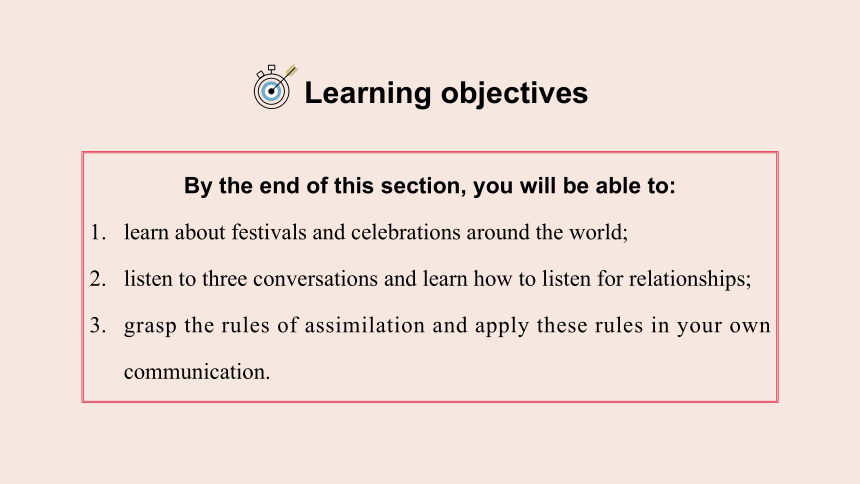
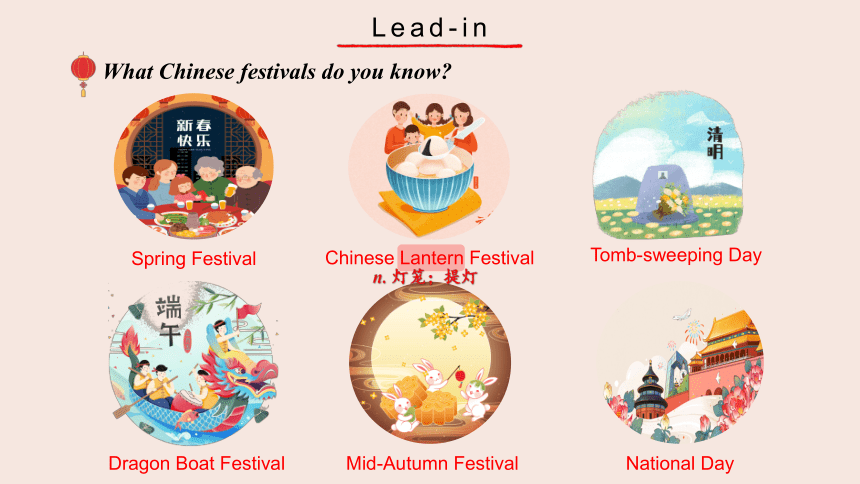



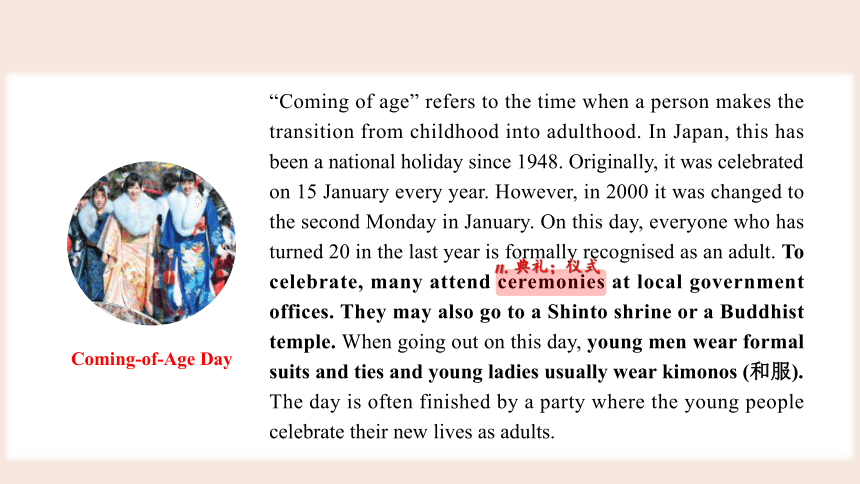
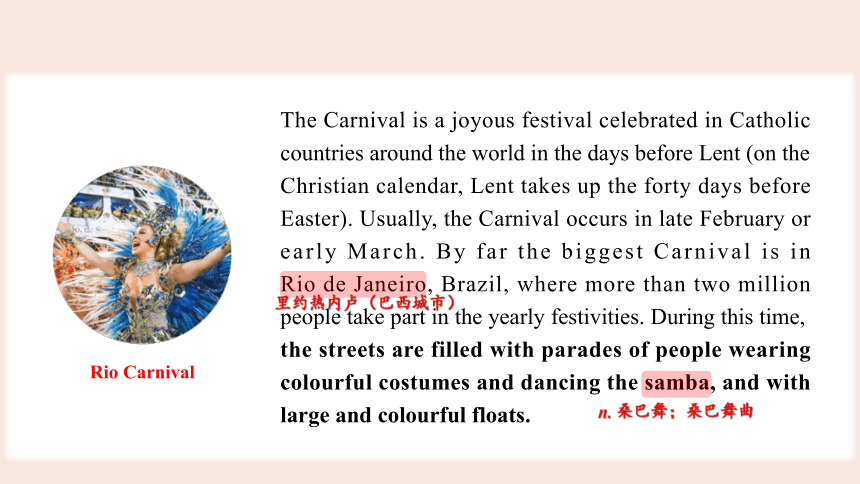
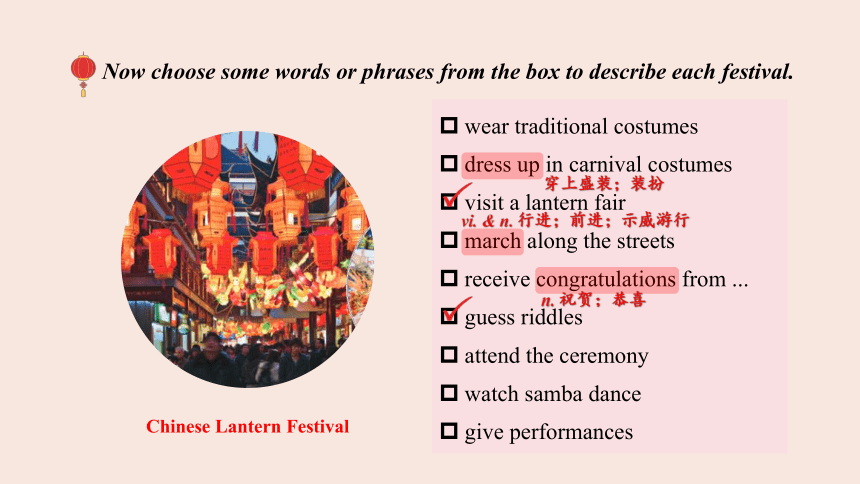
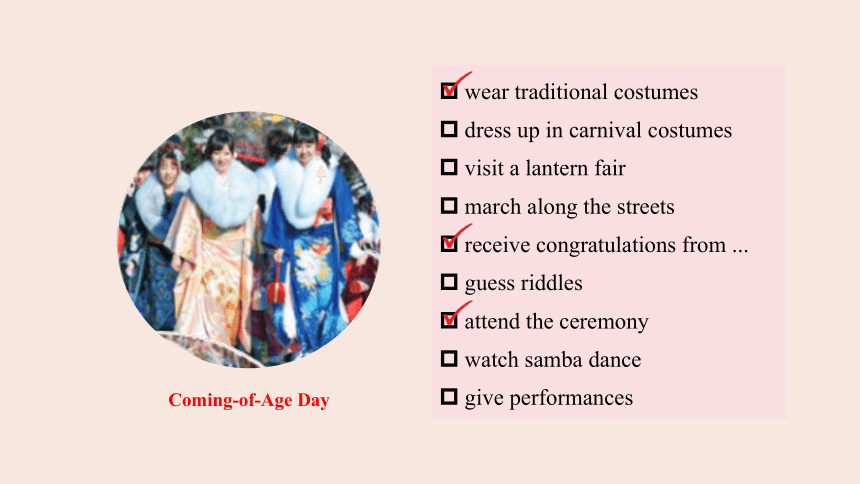
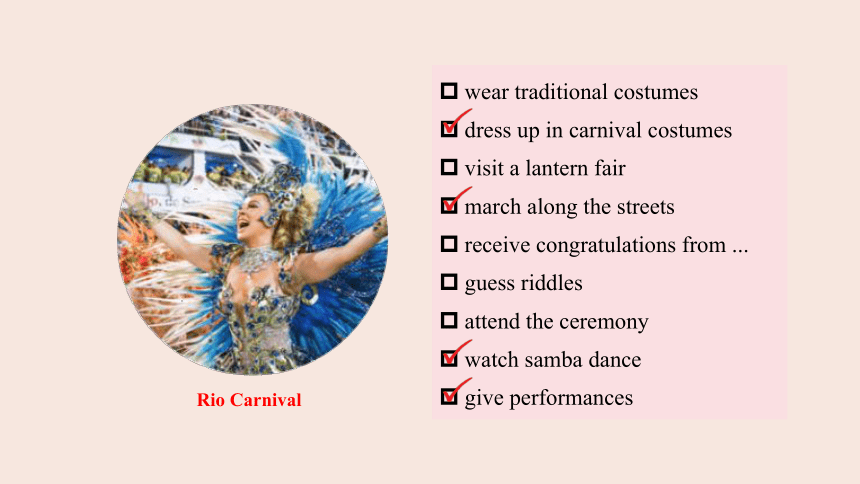

文档简介
(共31张PPT)
人教版(2019)必修三
Listening and Speaking
Talk about festival activities
Unit 1 Festivals and Celebrations
Learning objectives
By the end of this section, you will be able to:
learn about festivals and celebrations around the world;
listen to three conversations and learn how to listen for relationships;
grasp the rules of assimilation and apply these rules in your own communication.
What Chinese festivals do you know
Lead-in
Spring Festival
Chinese Lantern Festival
Tomb-sweeping Day
Dragon Boat Festival
Mid-Autumn Festival
National Day
n. 灯笼;提灯
Can you list some foreign festivals
Christmas
Halloween
Thanksgiving Day
Coming-of-Age Day
(成人节)
Rio Carnival
(里约热内卢狂欢节)
La Tomatina
(西班牙番茄大战)
n. 狂欢节;嘉年华
万圣节前夕
感恩节
Pre-listening
Before you listen, look at the photos below. How much do you know about the three festivals
Taking place on the fifteenth day of the first month of the lunar year, the Lantern Festival is generally celebrated in February or March. On this day, people carry or display traditional paper lanterns and solve riddles. As it is a popular festival for Chinese people around the world, it is celebrated in many different countries, even in the West.
Cultural Notes
Chinese Lantern Festival
n. 谜语;神秘事件
“Coming of age” refers to the time when a person makes the transition from childhood into adulthood. In Japan, this has been a national holiday since 1948. Originally, it was celebrated on 15 January every year. However, in 2000 it was changed to the second Monday in January. On this day, everyone who has turned 20 in the last year is formally recognised as an adult. To celebrate, many attend ceremonies at local government offices. They may also go to a Shinto shrine or a Buddhist temple. When going out on this day, young men wear formal suits and ties and young ladies usually wear kimonos (和服). The day is often finished by a party where the young people celebrate their new lives as adults.
Coming-of-Age Day
n. 典礼;仪式
The Carnival is a joyous festival celebrated in Catholic countries around the world in the days before Lent (on the Christian calendar, Lent takes up the forty days before Easter). Usually, the Carnival occurs in late February or early March. By far the biggest Carnival is in
Rio de Janeiro, Brazil, where more than two million people take part in the yearly festivities. During this time, the streets are filled with parades of people wearing colourful costumes and dancing the samba, and with large and colourful floats.
Rio Carnival
里约热内卢(巴西城市)
n. 桑巴舞;桑巴舞曲
wear traditional costumes
dress up in carnival costumes
visit a lantern fair
march along the streets
receive congratulations from ...
guess riddles
attend the ceremony
watch samba dance
give performances
Now choose some words or phrases from the box to describe each festival.
Chinese Lantern Festival
穿上盛装;装扮
vi. & n. 行进;前进;示威游行
n. 祝贺;恭喜
wear traditional costumes
dress up in carnival costumes
visit a lantern fair
march along the streets
receive congratulations from ...
guess riddles
attend the ceremony
watch samba dance
give performances
Coming-of-Age Day
wear traditional costumes
dress up in carnival costumes
visit a lantern fair
march along the streets
receive congratulations from ...
guess riddles
attend the ceremony
watch samba dance
give performances
Rio Carnival
Listen and write the order of the conversations next to the names of the festivals.
2
3
1
While-listening
(点击播放音频)
Match each conversation with the relationship between the speakers below.
_____________ a tour guide and members of a tour group
_____________ an interviewer and an interviewee
_____________ a reporter and a tourist
_____________ two friends
Conversation 1
Conversation 3
Conversation 2
(点击播放音频)
Listen for relationships
To listen for a relationship, you need to pay attention to how people talk to each other (e.g., friends usually call each other by first names) and some particular questions in the conversation (e.g., “Could I have the bill, please ” tells us that the speaker is a customer in a restaurant).
Listen again and complete the sentences with the correct words.
1. In Conversation 1, the woman is wearing _______ colours. It took her a
long time to do her hair and make-up, and to get ________. She is going
to meet her _______ soon.
2. In Conversation 2, Carla advises Li Mei to change her _____________.
This is because the weather is ______ and they will be outside for a long
time.
3. In Conversation 3, the people are enjoying the ______ show.
bright
dressed
family
dress and shoes
hot
lantern
(点击播放音频)
n. 化妆品;性格;构成方式
Listen again and make a list of each festival’s activities.
Chinese Lantern Festival: ___________________________________________
_______________________________________________________________
Coming-of-Age Day: ______________________________________________
_______________________________________________________________
Rio Carnival: _____________________________________________________
guess riddles, see the colourful lanterns, watch the
dragon or lion dances, eat yuanxiao
girls do their hair and make-up, wear traditional costumes,
attend the Coming-of-Age ceremony, say congratulations, have a party
wear carnival costumes, march along the streets, dance
(点击播放音频)
Conversation 1
Interviewer: Miss, congratulations on becoming an adult! You look amazing in your kimono. The bright
colours are terrific!
Girl: Really That’s kind of you to say so. Thank you.
Interviewer: You’re welcome. Did it take you much time to get ready today
Girl: Yes, actually. I spent hours doing my hair and make-up, and getting dressed. But it was
worth it, because I wanted to look my best at the Coming-of-Age ceremony.
Interviewer: Oh, you look great! Now that the ceremony is over, are you going to celebrate the day with
your family or friends
Girl: Yes. I’m going to meet my family soon, and we’re having a party tonight.
Interviewer: So what does “being an adult” mean to you
Girl: Well, I think it means being self-supporting and responsible for your actions and decisions,
and ... [Fade out.]
Transcript
Conversation 2
Li Mei: I’m ready for Carnival, Carla. Shall we go and join the parade now
Carla: You must be joking, Li Mei! That dress is too thick. Do you realise that it’s 35℃ out there
Also, we’re going to march along the streets for hours and dance until midnight. You need
to change.
Li Mei: OK. What should I wear
Carla: Wear something light and cool. I also think you need to wear more comfortable shoes. It’ll
be too tiring to walk or dance for a long time in those shoes.
Li Mei: Hmm ... You’re right. Can you wait for me I’ll change right away.
Carla: Sure.
[After a few seconds.]
Li Mei: Carla, how do I look now
Carla: Fantastic! Now let’s go and enjoy this festival! It’s going to be so exciting!
Conversation 3
Guide: Now, everyone, when we turn this next corner, you’ll all have a real treat for the eyes.
Man 1: Wow! These lanterns are amazing!
Woman: Excuse me, Miss Lin. Can you tell me what’s written on the pieces of paper Are they
wishes
Guide: Not exactly. They’re riddles for people to guess. If you guess correctly, you can get a nice
gift.
Woman: Oh, what a nice idea!
Man 2: What else can Chinese people do during this festival
Guide: Oh, they can do many things. They can watch the dragon and lion dances, and also eat
yuanxiao with their family. Yuanxiao is a kind of sweet dumpling. The Chinese word
“yuan” means “family unity and happiness”.
本句名言摘录于我国宋朝词人辛弃疾的著名词作《青玉案·元夕》英译本中的一句。此句展现了我国南宋时期民间庆祝元宵节的场景:明月当空,人们舞动着鱼形、龙形的彩灯,随着音乐载歌载舞。
Phoenix flutes make music,
The moonlight flashes,
Fish and dragon lanterns
whirl the whole night long.
— Xin Qiji
凤箫声动,玉壶光转,一夜鱼龙舞。
——辛弃疾
In the east wind tonight a thousand trees burst into bloom
And stars are blown down like rain;
The whole perfumed road is thronged
With fine carriages and horses bright with gems;
Phoenix flutes make music,
The moonlight flashes,
Fish and dragon lanterns whirl the whole night long.
Golden willow and butterfly trinkets in her hair,
Laughing and chatting she leaves a faint fragrance behind.
A thousand times I search for her in the crowd
And, suddenly turning my head,
Discover her where the lantern lights are dim.
东风夜放花千树。
更吹落、星如雨。
宝马雕车香满路。
凤箫声动,
玉壶光转,
一夜鱼龙舞。
蛾儿雪柳黄金缕。
笑语盈盈暗香去。
众里寻他千百度。
蓦然回首,
那人却在,
灯火阑珊处。
The Lantern Festival
青玉案·元夕
EXAMPLE
A: I think the Rio Carnival would be the most exciting.
After all, as you know, I love to dance!
B: I love dancing, too, but I’m not sure I’d enjoy it in
such hot weather.
A: So which festival do you like best
B: I like ...
Post-listening
In pairs, discuss which of these festivals attracts you the most and why.
毕竟;别忘了
A: I think the Rio Carnival would be the most exciting. After all, as you know, I love to
dance!
B: I love dancing, too, but I’m not sure I’d enjoy it in such hot weather.
A: So which festival do you like best
B: I like the Coming-of-Age Day best.
A: Why is that
B: Well, I think it would be neat to dress up in traditional costumes and attend a ceremony to mark
becoming an adult. It is a special time, and so it would be nice to celebrate it with my friends and
family.
A: That’s true, but the Lantern Festival also has its good points.
B: What do you like best about it
A: Well, the lanterns are pretty cool to look at, and the dragon dances can be quite fun, but I like
eating yuanxiao with my family most of all.
Sample conversation
Listen and read aloud the words or phrases to your partner. Pay attention to the change in the pronunciation of the bold letters.
1. duty, education
2. use, usually
3. news, newspaper
4. is, issue
5. last year
6. in bed
7. those shirt
8. as you see
Pronunciation
(点击播放音频)
1. Did you enjoy the holiday
2. Miss, congratulations on becoming an adult!
3. It’ll be too tiring to walk or dance for a long time in those shoes.
4. I was hoping to hear that you had a great time throughout.
5. Children then take part in Easter egg hunts to find the eggs and win prizes.
6. In Mexico, the Day of the Dead is celebrated between October 31st and
November 2nd.
Are the consonants in bold pronounced the same in a word as in a sentence
Let’s see these sentences and think about the following question.
Classification
Rules
Let’s learn assimilation (同化).
Listen to the following sentences, paying attention to the consonants in bold. How do their pronunciations change when they are read in the sentences
1. Did you enjoy the holiday
2. Miss, congratulations on becoming an adult!
3. It’ll be too tiring to walk or dance for a long time in those shoes.
4. I was hoping to hear that you had a great time throughout.
5. Children then take part in Easter egg hunts to find the eggs and win prizes.
6. In Mexico, the Day of the Dead is celebrated between October 31st and
November 2nd.
Discuss the differences with your partner. Then listen and repeat.
(点击播放音频)
Let’s check your answers together.
1. Did you enjoy the holiday
2. Miss, congratulations on becoming an adult!
3. It’ll be too tiring to walk or dance for a long time in those shoes.
4. I was hoping to hear that you had a great time throughout.
5. Children then take part in Easter egg hunts to find the eggs and win prizes.
6. In Mexico, the Day of the Dead is celebrated between October 31st and November
2nd.
(点击播放音频)
dress up in carnival costumes (P2)
穿上狂欢节的盛装
dress (sb) up 穿上盛装;装扮
搭配
dress up in ... 穿上……
dress up for ... 为……盛装出席
dress (sb) up as ... (把某人)装扮/乔装打扮成……
例句
You don’t need to dress up to go to the mall — jeans and a T-shirt are fine.
去商场不必穿正装——牛仔裤加T恤衫就可以了。
Paul dressed himself up as a princess.
保罗把自己装扮成一个王子。
Language points
1
receive congratulations from ... (P2)
收到来自……的祝贺
congratulation /k n ɡr t u le n/ n. 祝贺;恭喜
搭配
Congratulations! 恭喜恭喜!(常用作祝贺语)
Congratulations (to sb) on sth! 祝贺(某人)某事!
offer/send one’s congratulations (to ... ) on sth 因某事(向……)致以祝贺
a letter of congratulation 贺信
拓展
congratulate vt. 向(某人)道贺;(因某事)为自己感到自豪
congratulate sb on sth 因某事向某人道贺
congratulate oneself on sth 因某事感到自豪
2
例句
— I have passed the examination! 我通过考试啦!
— Congratulations! 恭喜恭喜!
Congratulations on your perfect performance!
祝贺你,表现完美!
Friends send their congratulations to Tim because he has been admitted into Peking University.
朋友们祝贺蒂姆,因为他被北京大学录取了。
We have received many letters of congratulation.
我们收到了许多祝贺信。
I congratulate myself on taking first place in the writing contest.
我为自己在写作比赛中获得第一名而感到自豪。
Homework
Choose one conversation and do role-play. One student plays as an interviewer, and the other student plays as an interviewee. There are some questions suggested.
What is the purpose of this festival
How do you usually celebrate this festival
What do you like best about this festival
人教版(2019)必修三
Listening and Speaking
Talk about festival activities
Unit 1 Festivals and Celebrations
Learning objectives
By the end of this section, you will be able to:
learn about festivals and celebrations around the world;
listen to three conversations and learn how to listen for relationships;
grasp the rules of assimilation and apply these rules in your own communication.
What Chinese festivals do you know
Lead-in
Spring Festival
Chinese Lantern Festival
Tomb-sweeping Day
Dragon Boat Festival
Mid-Autumn Festival
National Day
n. 灯笼;提灯
Can you list some foreign festivals
Christmas
Halloween
Thanksgiving Day
Coming-of-Age Day
(成人节)
Rio Carnival
(里约热内卢狂欢节)
La Tomatina
(西班牙番茄大战)
n. 狂欢节;嘉年华
万圣节前夕
感恩节
Pre-listening
Before you listen, look at the photos below. How much do you know about the three festivals
Taking place on the fifteenth day of the first month of the lunar year, the Lantern Festival is generally celebrated in February or March. On this day, people carry or display traditional paper lanterns and solve riddles. As it is a popular festival for Chinese people around the world, it is celebrated in many different countries, even in the West.
Cultural Notes
Chinese Lantern Festival
n. 谜语;神秘事件
“Coming of age” refers to the time when a person makes the transition from childhood into adulthood. In Japan, this has been a national holiday since 1948. Originally, it was celebrated on 15 January every year. However, in 2000 it was changed to the second Monday in January. On this day, everyone who has turned 20 in the last year is formally recognised as an adult. To celebrate, many attend ceremonies at local government offices. They may also go to a Shinto shrine or a Buddhist temple. When going out on this day, young men wear formal suits and ties and young ladies usually wear kimonos (和服). The day is often finished by a party where the young people celebrate their new lives as adults.
Coming-of-Age Day
n. 典礼;仪式
The Carnival is a joyous festival celebrated in Catholic countries around the world in the days before Lent (on the Christian calendar, Lent takes up the forty days before Easter). Usually, the Carnival occurs in late February or early March. By far the biggest Carnival is in
Rio de Janeiro, Brazil, where more than two million people take part in the yearly festivities. During this time, the streets are filled with parades of people wearing colourful costumes and dancing the samba, and with large and colourful floats.
Rio Carnival
里约热内卢(巴西城市)
n. 桑巴舞;桑巴舞曲
wear traditional costumes
dress up in carnival costumes
visit a lantern fair
march along the streets
receive congratulations from ...
guess riddles
attend the ceremony
watch samba dance
give performances
Now choose some words or phrases from the box to describe each festival.
Chinese Lantern Festival
穿上盛装;装扮
vi. & n. 行进;前进;示威游行
n. 祝贺;恭喜
wear traditional costumes
dress up in carnival costumes
visit a lantern fair
march along the streets
receive congratulations from ...
guess riddles
attend the ceremony
watch samba dance
give performances
Coming-of-Age Day
wear traditional costumes
dress up in carnival costumes
visit a lantern fair
march along the streets
receive congratulations from ...
guess riddles
attend the ceremony
watch samba dance
give performances
Rio Carnival
Listen and write the order of the conversations next to the names of the festivals.
2
3
1
While-listening
(点击播放音频)
Match each conversation with the relationship between the speakers below.
_____________ a tour guide and members of a tour group
_____________ an interviewer and an interviewee
_____________ a reporter and a tourist
_____________ two friends
Conversation 1
Conversation 3
Conversation 2
(点击播放音频)
Listen for relationships
To listen for a relationship, you need to pay attention to how people talk to each other (e.g., friends usually call each other by first names) and some particular questions in the conversation (e.g., “Could I have the bill, please ” tells us that the speaker is a customer in a restaurant).
Listen again and complete the sentences with the correct words.
1. In Conversation 1, the woman is wearing _______ colours. It took her a
long time to do her hair and make-up, and to get ________. She is going
to meet her _______ soon.
2. In Conversation 2, Carla advises Li Mei to change her _____________.
This is because the weather is ______ and they will be outside for a long
time.
3. In Conversation 3, the people are enjoying the ______ show.
bright
dressed
family
dress and shoes
hot
lantern
(点击播放音频)
n. 化妆品;性格;构成方式
Listen again and make a list of each festival’s activities.
Chinese Lantern Festival: ___________________________________________
_______________________________________________________________
Coming-of-Age Day: ______________________________________________
_______________________________________________________________
Rio Carnival: _____________________________________________________
guess riddles, see the colourful lanterns, watch the
dragon or lion dances, eat yuanxiao
girls do their hair and make-up, wear traditional costumes,
attend the Coming-of-Age ceremony, say congratulations, have a party
wear carnival costumes, march along the streets, dance
(点击播放音频)
Conversation 1
Interviewer: Miss, congratulations on becoming an adult! You look amazing in your kimono. The bright
colours are terrific!
Girl: Really That’s kind of you to say so. Thank you.
Interviewer: You’re welcome. Did it take you much time to get ready today
Girl: Yes, actually. I spent hours doing my hair and make-up, and getting dressed. But it was
worth it, because I wanted to look my best at the Coming-of-Age ceremony.
Interviewer: Oh, you look great! Now that the ceremony is over, are you going to celebrate the day with
your family or friends
Girl: Yes. I’m going to meet my family soon, and we’re having a party tonight.
Interviewer: So what does “being an adult” mean to you
Girl: Well, I think it means being self-supporting and responsible for your actions and decisions,
and ... [Fade out.]
Transcript
Conversation 2
Li Mei: I’m ready for Carnival, Carla. Shall we go and join the parade now
Carla: You must be joking, Li Mei! That dress is too thick. Do you realise that it’s 35℃ out there
Also, we’re going to march along the streets for hours and dance until midnight. You need
to change.
Li Mei: OK. What should I wear
Carla: Wear something light and cool. I also think you need to wear more comfortable shoes. It’ll
be too tiring to walk or dance for a long time in those shoes.
Li Mei: Hmm ... You’re right. Can you wait for me I’ll change right away.
Carla: Sure.
[After a few seconds.]
Li Mei: Carla, how do I look now
Carla: Fantastic! Now let’s go and enjoy this festival! It’s going to be so exciting!
Conversation 3
Guide: Now, everyone, when we turn this next corner, you’ll all have a real treat for the eyes.
Man 1: Wow! These lanterns are amazing!
Woman: Excuse me, Miss Lin. Can you tell me what’s written on the pieces of paper Are they
wishes
Guide: Not exactly. They’re riddles for people to guess. If you guess correctly, you can get a nice
gift.
Woman: Oh, what a nice idea!
Man 2: What else can Chinese people do during this festival
Guide: Oh, they can do many things. They can watch the dragon and lion dances, and also eat
yuanxiao with their family. Yuanxiao is a kind of sweet dumpling. The Chinese word
“yuan” means “family unity and happiness”.
本句名言摘录于我国宋朝词人辛弃疾的著名词作《青玉案·元夕》英译本中的一句。此句展现了我国南宋时期民间庆祝元宵节的场景:明月当空,人们舞动着鱼形、龙形的彩灯,随着音乐载歌载舞。
Phoenix flutes make music,
The moonlight flashes,
Fish and dragon lanterns
whirl the whole night long.
— Xin Qiji
凤箫声动,玉壶光转,一夜鱼龙舞。
——辛弃疾
In the east wind tonight a thousand trees burst into bloom
And stars are blown down like rain;
The whole perfumed road is thronged
With fine carriages and horses bright with gems;
Phoenix flutes make music,
The moonlight flashes,
Fish and dragon lanterns whirl the whole night long.
Golden willow and butterfly trinkets in her hair,
Laughing and chatting she leaves a faint fragrance behind.
A thousand times I search for her in the crowd
And, suddenly turning my head,
Discover her where the lantern lights are dim.
东风夜放花千树。
更吹落、星如雨。
宝马雕车香满路。
凤箫声动,
玉壶光转,
一夜鱼龙舞。
蛾儿雪柳黄金缕。
笑语盈盈暗香去。
众里寻他千百度。
蓦然回首,
那人却在,
灯火阑珊处。
The Lantern Festival
青玉案·元夕
EXAMPLE
A: I think the Rio Carnival would be the most exciting.
After all, as you know, I love to dance!
B: I love dancing, too, but I’m not sure I’d enjoy it in
such hot weather.
A: So which festival do you like best
B: I like ...
Post-listening
In pairs, discuss which of these festivals attracts you the most and why.
毕竟;别忘了
A: I think the Rio Carnival would be the most exciting. After all, as you know, I love to
dance!
B: I love dancing, too, but I’m not sure I’d enjoy it in such hot weather.
A: So which festival do you like best
B: I like the Coming-of-Age Day best.
A: Why is that
B: Well, I think it would be neat to dress up in traditional costumes and attend a ceremony to mark
becoming an adult. It is a special time, and so it would be nice to celebrate it with my friends and
family.
A: That’s true, but the Lantern Festival also has its good points.
B: What do you like best about it
A: Well, the lanterns are pretty cool to look at, and the dragon dances can be quite fun, but I like
eating yuanxiao with my family most of all.
Sample conversation
Listen and read aloud the words or phrases to your partner. Pay attention to the change in the pronunciation of the bold letters.
1. duty, education
2. use, usually
3. news, newspaper
4. is, issue
5. last year
6. in bed
7. those shirt
8. as you see
Pronunciation
(点击播放音频)
1. Did you enjoy the holiday
2. Miss, congratulations on becoming an adult!
3. It’ll be too tiring to walk or dance for a long time in those shoes.
4. I was hoping to hear that you had a great time throughout.
5. Children then take part in Easter egg hunts to find the eggs and win prizes.
6. In Mexico, the Day of the Dead is celebrated between October 31st and
November 2nd.
Are the consonants in bold pronounced the same in a word as in a sentence
Let’s see these sentences and think about the following question.
Classification
Rules
Let’s learn assimilation (同化).
Listen to the following sentences, paying attention to the consonants in bold. How do their pronunciations change when they are read in the sentences
1. Did you enjoy the holiday
2. Miss, congratulations on becoming an adult!
3. It’ll be too tiring to walk or dance for a long time in those shoes.
4. I was hoping to hear that you had a great time throughout.
5. Children then take part in Easter egg hunts to find the eggs and win prizes.
6. In Mexico, the Day of the Dead is celebrated between October 31st and
November 2nd.
Discuss the differences with your partner. Then listen and repeat.
(点击播放音频)
Let’s check your answers together.
1. Did you enjoy the holiday
2. Miss, congratulations on becoming an adult!
3. It’ll be too tiring to walk or dance for a long time in those shoes.
4. I was hoping to hear that you had a great time throughout.
5. Children then take part in Easter egg hunts to find the eggs and win prizes.
6. In Mexico, the Day of the Dead is celebrated between October 31st and November
2nd.
(点击播放音频)
dress up in carnival costumes (P2)
穿上狂欢节的盛装
dress (sb) up 穿上盛装;装扮
搭配
dress up in ... 穿上……
dress up for ... 为……盛装出席
dress (sb) up as ... (把某人)装扮/乔装打扮成……
例句
You don’t need to dress up to go to the mall — jeans and a T-shirt are fine.
去商场不必穿正装——牛仔裤加T恤衫就可以了。
Paul dressed himself up as a princess.
保罗把自己装扮成一个王子。
Language points
1
receive congratulations from ... (P2)
收到来自……的祝贺
congratulation /k n ɡr t u le n/ n. 祝贺;恭喜
搭配
Congratulations! 恭喜恭喜!(常用作祝贺语)
Congratulations (to sb) on sth! 祝贺(某人)某事!
offer/send one’s congratulations (to ... ) on sth 因某事(向……)致以祝贺
a letter of congratulation 贺信
拓展
congratulate vt. 向(某人)道贺;(因某事)为自己感到自豪
congratulate sb on sth 因某事向某人道贺
congratulate oneself on sth 因某事感到自豪
2
例句
— I have passed the examination! 我通过考试啦!
— Congratulations! 恭喜恭喜!
Congratulations on your perfect performance!
祝贺你,表现完美!
Friends send their congratulations to Tim because he has been admitted into Peking University.
朋友们祝贺蒂姆,因为他被北京大学录取了。
We have received many letters of congratulation.
我们收到了许多祝贺信。
I congratulate myself on taking first place in the writing contest.
我为自己在写作比赛中获得第一名而感到自豪。
Homework
Choose one conversation and do role-play. One student plays as an interviewer, and the other student plays as an interviewee. There are some questions suggested.
What is the purpose of this festival
How do you usually celebrate this festival
What do you like best about this festival
